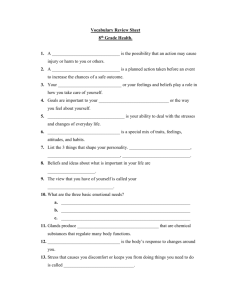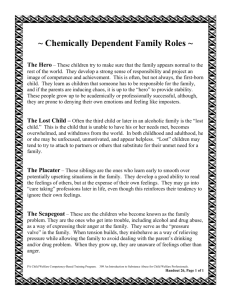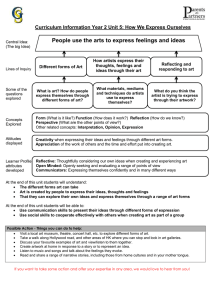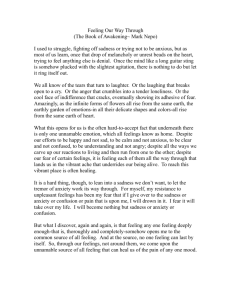Healthy Relationships
advertisement
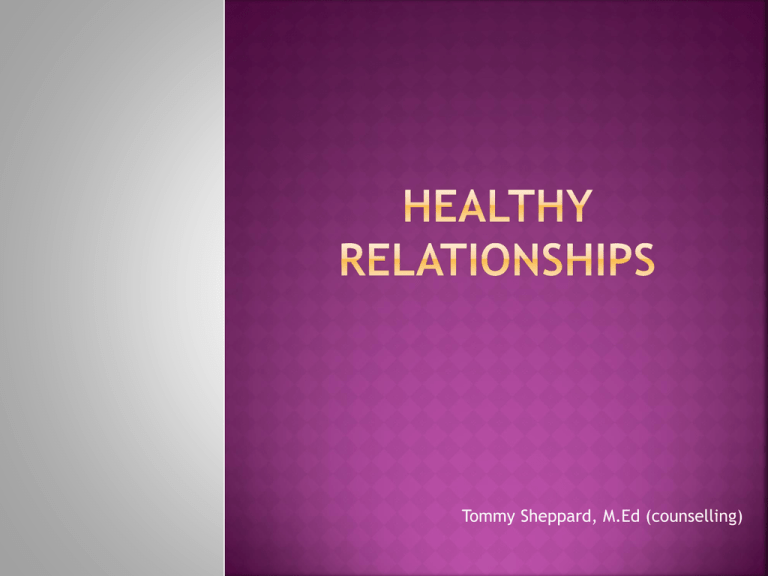
Tommy Sheppard, M.Ed (counselling) Friendship Parent-child Boss-worker Dating Relationships Boyfriend-girlfriend Boyfriend-boyfriend Girlfriend-girlfriend Sibling Teacher-student Acquaintance Roommate Mutual Respect Trust Honesty Support Fairness/Equality Separate Identities Good Communication Does he or she get how cool you are and why? (Watch out if the answer to the first part is yes but only because The key is that your partner is into you for who you are — for your great sense of humor, your love of reality TV, etc. Does your partner listen when you say you're not comfortable doing something and then back off right away? Respect in a relationship means that each person values who the other is and understands — and would never challenge — the other person's boundaries. you're acting like someone you're not!) You're talking with a person from French class and your partner walks by. Do they completely lose their cool or keep walking because they knows you'd never cheat on them? It's OK to get a little jealous sometimes — jealousy is a natural emotion. But how a person reacts when feeling jealous is what matters. There's no way you can have a healthy relationship if you don't trust each other. Trusting Not Trusting Lets you hang out with your friends Calls you every second of the day and demands information Understands when you have to change plans Won’t let you change plans or makes you feel guilty Lets you wear what you want Get’s jealous when other people are talking to you This one goes hand-in-hand with trust because it's tough to trust someone when one of you isn't being honest. Have you ever caught your partner in a major lie? Like they told you that they had to work on Friday night but it turned out they were at the movies with their friends? The next time they say they have to work, you'll have a lot more trouble believing them and the trust will be on shaky ground. It's not just in bad times that your partner should support you. Some people are great when your whole world is falling apart but can't take being there when things are going right (and vice versa). In a healthy relationship, your significant other is there with a shoulder to cry on when you find out your parents are getting divorced and to celebrate with you when you get the lead in a play. You need to have give-and-take in your relationship, too. Do you take turns choosing which new movie to see? As a couple, do you hang out with your partner's friends as often as you hang out with yours? It's not like you have to keep a running count and make sure things are exactly even, of course. But you'll know if it isn't a pretty fair balance. Things get bad really fast when a relationship turns into a power struggle, with one person fighting to get his or her way all the time. In a healthy relationship, everyone needs to make compromises. But that doesn't mean you should feel like you're losing out on being yourself. When you started going out, you both had your own lives (families, friends, interests, hobbies, etc.) and that shouldn't change. Neither of you should have to pretend to like something you don't, or give up seeing your friends, or drop out of activities you love. And you also should feel free to keep developing new talents or interests, making new friends, and moving forward. We all know how many different meanings the little phrase "no, nothing's wrong" can have, depending on who's saying it! But what's important is to ask if you're not sure what he or she means, and speak honestly and openly so that the miscommunication is avoided in the first place. Never keep a feeling bottled up because you're afraid it's not what your partner wants to hear or because you worry about sounding silly. And if you need some time to think something through before you're ready to talk about it, the right person will give you some space to do that if you ask for it. Healthy relationships maintain a balance between the individuals involved in the relationship. If the relationship is all about ME, then I am focusing on getting my needs met and expect you to make my needs your priority as well—and your needs suffer. If the relationship is all about YOU, then I am focusing on getting your needs met at the expense of my own. If the relationship is about US, then we are both focused on the relationship that we lose our individuality. you you In a healthy relationship, YOU, ME and US are in balance most of the time. However, sometimes YOU or ME may need more attention…and that’s ok. us A relationship is unhealthy when it involves mean, disrespectful, controlling, or abusive behavior. Some people live in homes with parents who fight a lot or abuse each other — emotionally, verbally, or physically. For some people who have grown up around this kind of behavior it can almost seem normal or OK. It's not! When a partner uses verbal insults, mean language, nasty putdowns, gets physical by hitting or slapping, or forces someone into sexual activity, it's a sign of verbal, emotional, or physical abuse. Ask yourself, does my partner: get angry when I don't drop everything for him or her? criticize the way I look or dress say I'll never be able to find anyone else who would date me? keep me from seeing friends or from talking to any other guys or girls? want me to quit an activity, even though I love it? ever raise a hand when angry, like he or she is about to hit me? try to force me to go further sexually than I want to? There are lots of different reasons why people break up. Growing apart. You might find that your interests, ideas, values, and feelings aren't as well matched as you thought they were. Changing your mind or your feelings about the other person is another. Perhaps you just don't enjoy being together. Maybe you argue or don't want the same thing. You might have developed feelings for someone else. You've discovered you're just not interested in having a serious relationship right now. Most people go through a break-up (or several break-ups) in their lives. If you've ever been through it, you know it can be painful — even if it seems like it's for the best. Some people avoid the unpleasant task of starting a difficult conversation. Others have a "just-get-itover-with" attitude. But neither of these approaches is the best one. Avoiding just prolongs the situation (and may end up hurting the other person more). And if you rush into a difficult conversation without thinking it through, you may say things you regret. Something in the middle works best: Think things through so you're clear with yourself on why you want to break up. Then act. DO’S: Think over what you want and why you want it. Think about what you'll say and how the other person might react. Have good intentions. Let the other person know he or she matters to you. Think about Be honest — but not brutal. Tell the other person the things that attracted you in the Say it in person. You've shared a lot with each other. Respect that (and show your good If it helps, confide in someone you trust. Take time to consider your feelings and the reasons for your decision. Be true to yourself. Even if the other person might be hurt by your decision, it's OK to do what's right for you. You just need to do it in a sensitive way. Will your BF or GF be surprised? Sad? Mad? Hurt? Or even relieved? Thinking about the other person's point of view and feelings can help you be sensitive. It also helps you prepare. Do you think the person you're breaking up with might cry? Lose his or her temper? How will you deal with that kind of reaction? the qualities you want to show toward the other person — like honesty, kindness, sensitivity, respect, and caring. first place, and what you like about him or her. Then say why you want to move on. "Honesty" doesn't mean "harsh." Don't pick apart the other person's qualities as a way to explain what's not working. Think of ways to be kind and gentle while still being honest. qualities) by breaking up in person. If you live far away, try to video chat or at least make a phone call. Breaking up through texting or Facebook may seem easy. But think about how you'd feel if your BF or GF did that to you — and what your friends would say about that person's character! It can help to talk through your feelings with a trusted friend. But be sure the person you confide in can keep it private until you have your actual break-up conversation with your BF or GF. Make sure your BF/GF hears it from you first — not from someone else. That's one reason why parents, older sisters or brothers, and other adults can be great to talk to. They're not going to blab or let it slip out accidentally. DON'T: Don't avoid the other person or the conversation you need to have. Dragging things out makes it harder in the long run — for you and your partner. Plus, when people put things off, information can leak out anyway. You never want the person you're breaking up with to hear it from someone else before hearing it from you. Don't rush into a difficult conversation without thinking it through. You may say things you regret. Don't disrespect. Speak about your ex (or soon-to-be ex) with respect. Be careful not to gossip or badmouth him or her. Think about how you'd feel. You'd want your ex to say only positive things about you after you're no longer together. Plus, you never know — your ex could turn into a friend or you might even rekindle a romance someday. Whether they last a long time or a short time, relationships can have special meaning and value. Each relationship can teach us something about ourselves, another person, and what we want and need in a future partner. It's a chance for us to learn to care about another person and to experience being cared about. A break-up is an opportunity to learn, too. It's not easy. But it's a chance to do your best to respect another person's feelings. Ending a relationship — as hard as it is — builds our skills when it comes to being honest and kind during difficult conversations. Share your feelings. Don't be afraid to cry. Some people find that sharing their feelings with someone they trust — someone who recognizes what they're going through — helps them feel better. That could mean talking over all the things you feel, even having a good cry on the shoulder of a comforting friend or family member. If you feel like someone can't relate to what you're going through or is dismissive of your feelings, find someone more sympathetic to talk to. (Talk with a friend or family member, a teacher, or counsellor.) Going through a break-up can be really tough, and getting some of those raw emotions out can be a big help. There's no shame in crying now and then. No one has to see you do it — you don't have to start blubbering in class or at soccer practice or anything. Just a find a place where you can be alone, like crying into your pillow at night or in the shower when you're getting ready for the day. Remember what's good about you. This one is really important. Sometimes Give yourself time. people with broken hearts start to blame themselves for what's happened. They may be really down on themselves, exaggerating their faults as though they did something to deserve the unhappiness they're experiencing. If you find this happening to you, nip it in the bud! Remind yourself of your good qualities, and if you can't think of them because your broken heart is clouding your view, get your friends to remind you. Take good care of yourself. A broken heart can be very stressful so don't let the rest of your body get broken too. Get lots of sleep, eat healthy foods, and exercise regularly to minimize stress and depression and give your self-esteem a boost. Do the things you normally enjoy. Whether it's seeing a movie or going to a concert, do something fun to take your mind off the negative feelings for a while. Keep yourself busy. Sometimes this is difficult when you're coping with sadness and grief, but it really helps. This is a great time to redecorate your room or try a new hobby. That doesn't mean you shouldn't think about what happened — working things through in our minds is all part of the healing process — it just means you should focus on other things too. It takes time for sadness to go away. Almost everyone thinks they won't feel normal again, but the human spirit is amazing — and the heartbreak almost always heals after a while. But how long will that take? That depends on what caused your heartbreak, how you deal with loss, and how quickly you tend to bounce back from things. Getting over a break-up can take a couple of days to many weeks — and sometimes even months. Some people feel that nothing will make them happy again and resort to alcohol or drugs. Others feel angry and want to hurt themselves or someone else. People who drink, do drugs, or cut themselves to escape from the reality of a loss may think they are numbing their pain, but the feeling is only temporary. They're not really dealing with the pain, only masking it, which makes all their feelings build up inside and prolongs the sadness. Sometimes the sadness is so deep — or lasts so long — that a person may need some extra support. For someone who isn't starting to feel better after a few weeks or who continues to feel depressed, talking to a counsellor or therapist can be very helpful! Always remember sex does not = love! TEENS Talk About Love: http://bcove.me/i9a8ak0i What’s Your Relationship Reality? Healthy Relationships! http://kidshealth.org/


